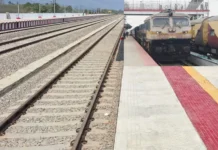Monday Musing
[ Amar Sangno ]
Witnessing the short duration discussion initiated by Congress MLA Ninong Ering on the Right to Information (RTI) Act on day three of the ninth session of the seventh Arunachal Pradesh Legislative Assembly recently baffled me, and got me ruminating over the role of the legislators, particularly the principal opposition party, on the floor of the house.
Ering had argued for amending the RTI guidelines and sought collective support to discourage and check the Act from being misused as a blackmailing tool.
It quickly resonated among the legislators, who were spouting over the misuse of the RTI Act, and they demanded its amendment.
What surprised me the most was that Ering, a former union minister of state, bureaucrat and teacher, considered to be one of the most well-versed and articulate politicians in the seventh legislative assembly, was seeking a mechanism to check the menacing blackmail culture.
Ering’s colleague, Borduria-Bogapani MLA Wanglin Lowangdong’s argument stunned me when he sought exemption of the RTI Act across Arunachal.
BJP legislators also joined the chorus, demanding amendment of the RTI Act to prevent it from being misused by activists. The legislators argued that the “menace” of RTI applications becomes detrimental to developmental works or projects, and that it should be discouraged strongly.
Paradoxically, the principal opposition party members were also seeking amendment and exemption of the RTI Act, instead of demanding that the Act be strengthened.
To my understanding, the fundamental arguments of the legislators were aimed towards shielding corrupt officers and concealing corruption in their respective areas by weakening the RTI Act, 2005, which empowers the citizens of India to seek information from the public authorities. None of the legislators who were seeking modification of the RTI guidelines touched upon the issues which led to the RTI becoming a blackmailing tool.
So, it is not wrong to draw my conclusion on the immutable fact that ‘everybody is on the same page in Arunachal when it comes to corruption’.
Itanagar MLA Techi Kaso and Chief Minister Pema Khandu upheld the democratic principle by defending the Act. Both Kaso and Khandu argued that, if the officials and departments are honest and transparent enough, they should not be worried about the RTI applications.
They further stated that this menacing RTI is trending in the governance system due to some corrupt officers and departments.
It is also undeniably true that some activists have chosen this fundamental right as a profession to extort money from corrupt officers. Their modus operandi is to establish a network with frustrated government officials (who are deprived of incentives and career progression) and ferret out sensitive information from them. If the information is beyond their comprehension, they outsource it to technical people who can point out flaws and lacunae. Once the flaws are zeroed down on, they resort to quid pro quo tactics – in other words, blackmailing.
The magnitude of the menace is immeasurable and prevalent in every works department in the state. That’s why the Act is infamously dubbed the ‘Right to Income’ Act here. It compels the public information officer concerned to view even a genuine information seeker as a professional blackmailer whenever they file for information. This stigma will also affect investigative journalists who rely on RTI applications to ferret out information from uncooperative government officials.
CM Khandu revealed that, since August 2006, the State Information Commission has received 2,933 RTI cases, out of which 2,433 cases have been disposed of and 500 cases are still pending.
In Chief Minister Khandu’s own words: “There is no need to be afraid of RTI applications if the officers and the departments concerned are clean.” He added that RTI is an Act of Parliament and the state has little scope to amend it.
Khandu has also nominated a three-member committee to study the scope of amending the RTI Act guidelines.
However, any attempt to weaken the RTI Act would encourage endemic corruption in Arunachal as the people at the helm of affairs would be shielded by a weak Act and their corrupt practices would be condoned by the political bosses.
The stronger the Act, the more transparent would be the governance system. Let’s not kill the RTI Act.


